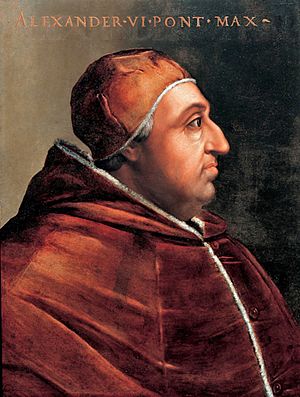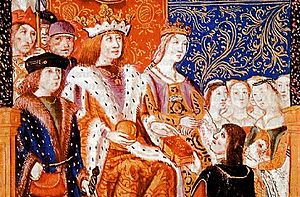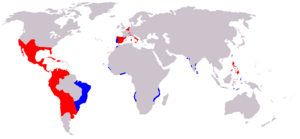Dudum siquidem facts for kids
Dudum siquidem (which means "A short while ago" in Latin) was an important official letter from Pope Alexander VI. It was issued on September 26, 1493. This letter was one of several "Bulls of Donation" sent to the Catholic Monarchs, Queen Isabella I of Castile and King Ferdinand II of Aragon.
Dudum siquidem added to an earlier letter called Inter caetera. It aimed to give Spain control over "all islands and mainlands... found and to be found... in the route of navigation or travel towards the west or south." This included lands in the west, south, east, and even India.
Contents
Why This Papal Bull Was Needed
Before Dudum siquidem, another papal letter, Aeterni regis (1481), had confirmed the Treaty of Alcáçovas. This treaty gave Castile the Canary Islands. It also granted Portugal all new lands found by Christians in Africa and the East Indies.
In 1492, Spain finished its Christian reconquest by capturing Granada. Soon after, Christopher Columbus began his famous voyages. He was looking for a western sea route to the rich lands of India. On October 12, 1492, Columbus landed in the West Indies. He thought he had reached India.
Columbus returned to Spain in March 1493 with exciting news. His discoveries caused a big competition between Portugal and the new Spanish Empire. Both wanted to claim these newly found lands.
On May 4, 1493, Pope Alexander VI issued Inter caetera. This letter tried to divide the non-Christian world outside Europe between Portugal and Spain. It said:
Among other works well pleasing to the Divine Majesty... this assuredly ranks highest, that... the Catholic faith and the Christian religion be exalted and be everywhere increased and spread... you should appoint to the aforesaid mainlands and islands worthy, God-fearing, learned, skilled, and experienced men, in order to instruct the aforesaid inhabitants and residents in the Catholic faith and train them in good morals.
This papal order marked the start of Spain's colonization of much of the New World. Later, this bull, combined with the Treaty of Tordesillas, accidentally gave Spain control over most of the Pacific Ocean and the west coast of North America. At the time, these areas were still unknown.
Spain likely asked the Pope for more land because they believed even richer territories were yet to be found. In August 1493, Portuguese ambassadors were in Barcelona. They were talking with Spain about various issues, including Portugal's plan to send ships to the lands Columbus discovered. At this time, Ferdinand and Isabella asked the Pope for more help. This led to the granting of Dudum siquidem on September 26.
The day before, on September 25, Columbus had already left Cádiz for his second voyage. He led seventeen ships with about 1,200 people. Many of them were settlers hoping to start new lives in the Indies.
What the Bull Granted
The bull Dudum siquidem is also known as the "extension of the donation." It expanded the land grants made in Inter caetera. It considered that Spanish explorers might sail west or south and reach eastern lands, discovering islands and mainlands that belonged to India.
Because of this, the Pope added to his earlier grants to Ferdinand and Isabella:
...we do in like manner amplify and extend our aforesaid gift, grant, assignment, and letters... to all islands and mainlands whatsoever, found and to be found, discovered and to be discovered, that are or may be or may seem to be in the route of navigation or travel towards the west or south, whether they be in western parts, or in the regions of the south and east and of India. We grant to you and your aforesaid heirs and successors full and free power... freely to take corporal possession of the said islands and countries and to hold them forever, and to defend them against whosoever may oppose.
This meant Spain could claim and control any new lands found on their westward or southward journeys, even if those lands were in the east or near India.
Its Impact and Legacy
Pope Alexander VI was from Valencia, Spain. His letters seemed to favor Spain's expansion over Portugal's. While he confirmed what Portugal already had, Dudum siquidem gave Spain more rights, which worried Portugal.
The specific mention of India caused a stir in Portugal. They started a diplomatic effort to limit the damage. The Pope refused to change his mind. So, King John II of Portugal negotiated directly with Ferdinand and Isabella. They agreed to use Inter caetera as a starting point. This led to an agreement to move the boundary line set in Inter caetera 270 leagues further west. This new agreement became the Treaty of Tordesillas.
In later centuries, Dudum siquidem was seen as giving Spain a free hand in the Pacific Ocean. Spain then developed a long-term presence there, especially in the Philippines.
Where the Texts Are Found
According to American historian Frances Gardiner Davenport, no copy of this bull has been found in the records of the Vatican. However, in the General Archive of the Indies in Seville, Spain, two original handwritten copies still exist. Both have the Pope's lead seal attached. Before these originals were found in the 20th century, some people doubted if the quotes from the bull were real.
See also
 In Spanish: Dudum siquidem para niños
In Spanish: Dudum siquidem para niños
- Catholic Church and the Age of Discovery
- History of the west coast of North America
- Portuguese colonization of the Americas
- Portuguese Empire
- Spanish Empire
 | Kyle Baker |
 | Joseph Yoakum |
 | Laura Wheeler Waring |
 | Henry Ossawa Tanner |




